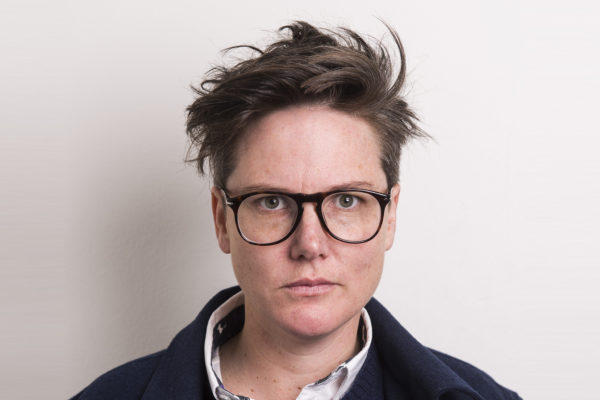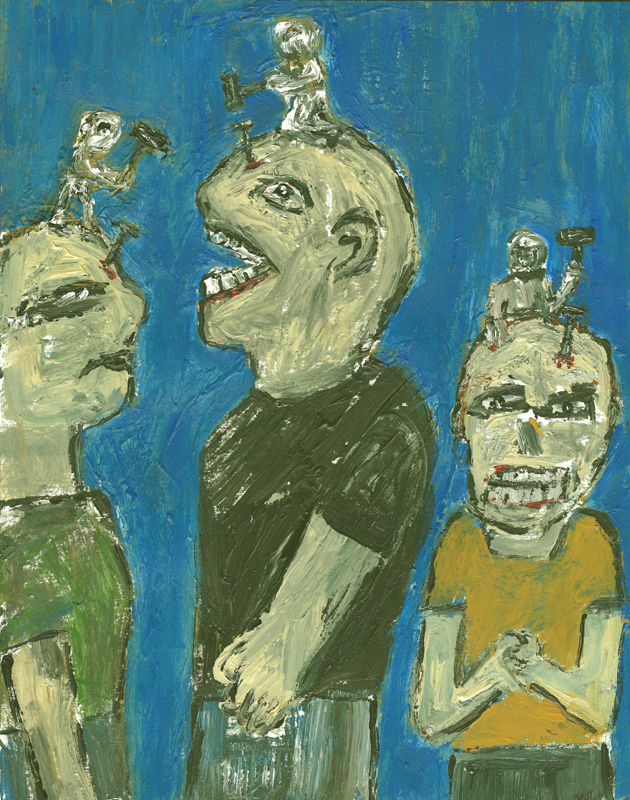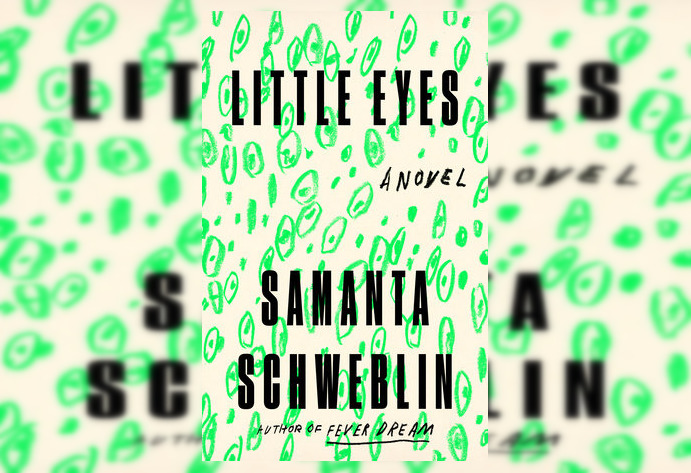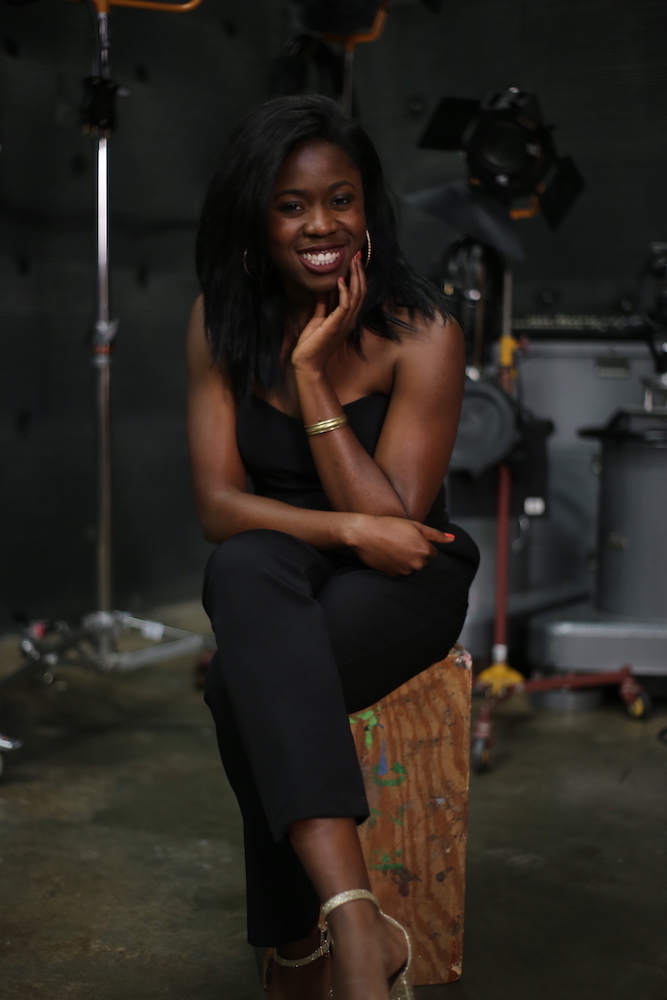On a Tuesday night in early April, I lead my father to a small theatre on Vandam Street, the Soho Playhouse. Snow is still stuck on the edges of sidewalks in stubborn grey sludge piles as if to say winter will throttle us all somehow. My father and I are full of doughy Neapolitan style pizza, but alert, thanks to the brusque 20-minute walk we just legged to get here. It’s two minutes to eight when we arrive, and we join the queue to pick up our tickets and shuffle into our seats for Hannah Gadsby’s stand-up show, Nanette.
On our way to the theatre we had passed the comedy touts on MacDougal Street. Each brandished their flyers and stickers, beckoning us into their basements, but I’d already bought the tickets for Nanette. We pushed through them with purpose.
Gadsby, like Dad and me, is an Australian. That’s not the reason we’re seeing her, though. We’re seeing her because a steady stream of my friends have posted news of her New York tour on my Facebook page. One in particular absolutely raved. “It destroyed me,” she said, and she didn’t mean it in the slang sense of the word—destroyed, like slayed, might mean it made you laugh so hard it hurt—she meant it totally disassembled her. Which is a remarkable recommendation for stand-up.
This was enough to pique my interest, and rope in my father while he’s here for a short visit from his home in London. (Nanette played there too, directly prior to arriving in New York.)
Nanette is about an hour and fifteen minutes long. No interval. No slides or music or puppets or visual aids. Nope. This is a woman, a microphone and a glass of water on a stool.
The Soho Playhouse is a small theatre with economy-class-level seat space. You are jammed in like cattle on a transport truck, and the night we go, the theatre is packed. I try to listen to the voices around me to see whether they are all Australians—a demographic who, as part of the great New York diaspora, bring better coffee and a level of dedication to swearing as punctuation not seen before on these shores. I’ve been here too long and no longer hear the foreign-ness of the American twang. And even with Dad in town, even though I’ve readjusted to the Aussie upward inflection, I just can’t tell. The voices smush together and I give up. The row in front of me are Americans—middle-aged women with straight white teeth talking about their next vacation— that’s as much as I can discern.
Gadsby is from the other end of Australia to me. I’m from Queensland, the northeastern state that most people, if trying to make a comparison, would tell Americans is the Florida of Australia. It’s hot, it’s humid, it’s where bananas and oranges and sugar cane grow. Crocodiles eat people there on occasion, and the politics are unpredictable. Gadsby’s a Tasmanian. She’s from the southernmost part of the country, a frigid little island off the bottom of the big one, which was for a time the epicenter of Australia’s whaling industry, and originally colonized as purely a prison. Whites killed almost all the indigenous people who lived there. In fact, it is where England’s invading genocide wrought the most comprehensive devastation. They brought disease and guns to the shores of the little isle and used both with debilitating effects. Declaring martial law in the 1820s, the state permitted colonizing whites to kill aboriginal people, and paid them a bounty for their capture or their bodies They rounded up those they could and exiled them to smaller islands. Tasmania is not a place, historically, that welcomes difference.
Also, Tasmania is the last place in Australia to decriminalize homosexuality.
- That’s the year they finally did it. Queensland did it in 1991, when my gay father (sitting next to me, tapping his foot as he does while waiting for a show to start) would have been 31. Gadsby, who is 40 now, would have been 19 when her home state finally decided her sexuality wasn’t illegal. Australia, as a nation, took another 20 years to legalize same sex marriage, eventually doing so in late 2017 after a messy, bigoted national debate in which one politician asked if people could marry other people of the same sex, what was to stop them marrying the Sydney Harbour Bridge? That wasn’t even the worst comparison, but you get the idea of the sophistication levels we were dealing with.
Gadsby, dressed in slacks, a button up shirt and a blazer, her short brown hair expertly and excellently styled, starts out with a series of jokes about her identity, her home state and her “people” (lesbians, if I haven’t been clear; her people are lesbians). She’s very funny. She’s got that ocker Aussie timbre and the self-depreciating manner of a person who doesn’t like to take up the space they do. We laugh, she laughs, all is well.
But Gadsby has a purpose with this show that is not revealed until you’re already in it, already feeling comfortable that she’s fulfilling her end of this comedian-audience bargain. She doesn’t ultimately want to make you laugh. She wants to make you feel what it’s like to be her. What it’s like to be born into a world that hates you. What it’s like to be born into a world that has made you illegal.
In this world of alternative facts and Twitter flame outs, insane conspiracies about children as crisis actors and Democrats as deep-state pedophiles, Gadsby has had enough. She no longer has time for the entitlement of the straight white man. She no longer has time for these silos we’ve all built online where we hear only from those whose experiences are like our own. It might be thrilling to find the people who “get” you, finally, but there are dangers in only listening to furious agreement. An inability to recognize and listen to other points of view leaves us with an inability to empathize or connect with people who aren’t “like us”.
She wants to peel off that bubble wrap you’ve placed around your ability to empathize and force you to relate to her. She will absolutely make you laugh, but she will also make you rethink everything you think about comedy and storytelling. Because Gadsby uses her own position as a lesbian feminist art history majoring comedian who can play an audience like a conductor swelling her strings section or tamping down the brass to force you to really think about what life is like in someone else’s bubble.
It is not adequate to describe Nanette as comedy, it is not fair to describe it as anything else, but it is something entirely its own, and it is a joy and despair to watch it unfold. Her command of the audience is masterful. She reveals her comic’s tricks as she uses them to strip us all bare. Gadsby has plotted out a journey from the sublime to the impossible to define. It’s heartbreaking, it’s hilarious, it will destroy you.
And hopefully, it’ll make you think, and it’ll let you sit uncomfortably for a little while in someone else’s shoes. Like the shoes of a 25-year-old gay man in 1980s Queensland with two children who just moved house for the third time because the neighbors have started making death threats again. Or in the shoes of a 17-year-old lesbian in 1990s Tasmania, waiting for a bus and being threatened with physical violence for talking to a woman, also waiting, with her boyfriend. It was nighttime, she was alone at the stop, and was talking to the woman to kill time. Without really looking at her, the man assumed she was a he, and came at her aggressively, shoving her. When she tells us this, there is shock on her face, like she still can’t believe it, all these years later.
Gadsby tells iterations of this story throughout Nanette. The first time, she points out that at 17 she didn’t know who she was, and so it surprised her that the man could think she was hitting on his girlfriend. “But, you know, I am charming,” she says, getting a big laugh.
It’s one of many. But nothing about Nanette is predictable. Don’t get too comfortable. Charm is a mask that enables the wearer to deliver unpleasant truths. In this powder keg of a show, Gadsby stretches the beguiling qualities of her charm to their limits, oversteps exactly as far as she wants to and snaps you out of yourself. Until you are standing in her shoes, looking at the world from an unfamiliar perspective.
After the show Dad and I stand in the street and try to process it. We usually talk through a trip to the theatre in great detail, but we can’t order our words or say anything clever. Instead, I say, “It’s really nice to hear such an ocker (thick Australian) accent again, haven’t heard one for a while.” And then we trip down the steps to the Spring St C, E stop and jump on the E.
Dad gets off at Penn Station, and I ride it all the way to Court Square. All the way still thinking about that 17-year-old lesbian at a bus stop in Tasmania.
Nanette is playing at Soho Playhouse until May 13. ♦



